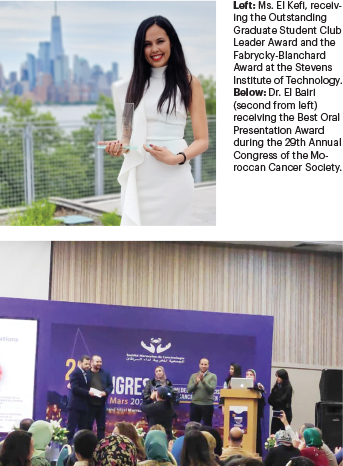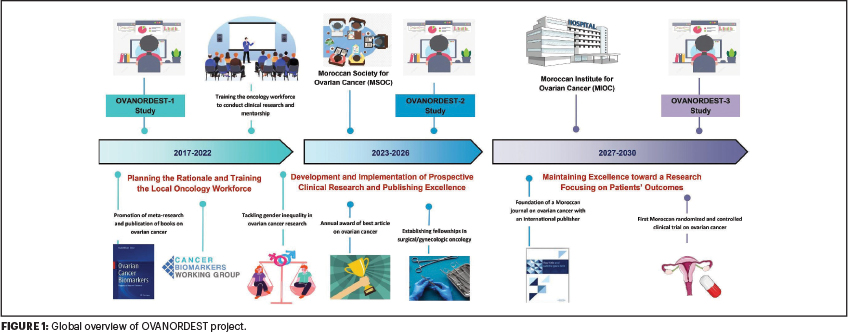In countries with a high income, research in oncology is sponsored by funding agencies and industry, which has meaningfully improved survival outcomes of patients with cancer. In contrast, the African continent is disadvantaged in all aspects of human development, particularly in the fields of innovation and research. Notably, oncology and cancer research are largely forgotten. There are huge deficits, as demonstrated by the marked increase in cancer burden in this area of the globe. Here, we each present our personal stories as a systems engineer [SEK] and an early-career cancer researcher [KEB] from Morocco who are pursuing our careers in research and oncology and striving to make an impact.
Health-Care Dreams
Safa El Kefi, PhD candidate: Becoming a doctor was an obvious goal for a child keen on science. However, life took another direction with my career, and I found myself a systems engineer at 25 years old. I had many successful opportunities as an engineer but still thought I needed to do more. The “health-care” dream still haunted me, and I realized that saving lives could go beyond diagnosis and treatment. This was when I started exploring how engineers can contribute to health care.
As a result of a year of investigation, I chose to pursue my research career abroad in the United States. My research applies human factors and ergonomics together with a systems perspective of engineering management to improve the experience of patients with cancer in health-care ecosystems. I am investigating the best communication pathways between oncologists and patients who are newly diagnosed with cancer; to what extent patient-centeredness can support that relationship mediating health information technology; and how we can predict the different patients’ behaviors and reactions to certain situations to predict their needs in a personalized way.1,2

In developed countries, we, human factors engineers, advocate for error prevention strategies focused on system design improvement rather than providing training and developing policies that are kept as ink on paper or taught in classes and forgotten in practices. Despite many challenges, the health-care research infrastructure in the United States is based on sustainable services, whereas it is based on resistance to change in my country, Tunisia.
Back home, saving a patient with cancer means providing him or her with the proper treatment. However, in developed countries, emotional support is another critical factor in treatment success. Further, in developed countries, technology is also used to support continuous follow-up of patients, their adherence to medication plans, and their engagement in decision--making. This approach is difficult to implement in developing countries because of ethical, financial, environmental, and legal factors.
A Good Research Environment
I found in the United States what I did not find in my home country: a good research environment, funding infrastructure, and reasonable access to essential resources. I received several awards for my research in my first 2 years abroad in the United States. From my school, I received the Outstanding Academic Achievement in a Doctoral Program Award for my outstanding research and academic performance; the Fabrycky-Blanchard award for exemplary academic performance, excellence in research, and promise in the study and practice of systems engineering; and even for my extracurricular work as President of the African Association, I received the Outstanding Graduate Student Club Leader Award.
I was also awarded the National Ergonomics Month 2021 contest Winner prize for the theme “Back to the Future: What Did We Leave Behind, and Where Are We Going?” by the Human Factors and Ergonomics Society. The Society’s challenge was to identify the gaps in the new norm we are approaching after the emergence of COVID-19 and the human factors opportunities and design spaces. My research path is drawn, and I am working hard to expand my collaborations and build my reputation as an engineering researcher in cancer care. The support that I am receiving from the competitive encouraging environment that I am in is pushing me to invest myself fully because I clearly can see the results of my work.
I should not forget, though, that I started my career journey in a developing country. However, I am in the United States now because of that country and will return there to create a change one day because, to paraphrase a well-known thought, “I believe one should be the change she wants to see in the world.”
A ‘Harvardian’ Career in Morocco
Khalid El Bairi, MD: Making a research career in oncology in an underresourced setting is challenging. Therefore, my original dream was to move from Morocco to another country, where research facilities and training are outstanding. I had the opportunity to be enrolled in a Harvard Medical School training program, but I could not participate, given the high tuition fees. Hence, I decided several years ago to make my “Harvardian” career here in Morocco without leaving my country.
The research environment of my setting in Morocco was at its beginning amid the significantly noticed shortage of clinician-scientists and the limited research opportunities available for junior investigators. Thus, I built a career in cancer research after developing my individually planned strategy3 in medical school.
After a break in my medical career to acquire the required skills in research methodology adapted to oncology, such as evidence-based medicine and biostatistics, I built my project called OVANORDEST (OVAire Dans le -NORD-EST; ovarian cancer in the Eastern region of Morocco), which encompasses three steps (Figure 1) to improve research in this aggressive women’s cancer based on bibliometric analysis.

We have successfully enhanced this area of research and treatment with what we have studied and published to date. We now can offer several publications4 on ovarian cancer that may improve patients’ outcomes, including a book on cancer biomarkers, two special journal issues encompassing an advanced discussion on platinum-resistant ovarian cancer published in the peer-reviewed journal Seminars in Cancer Biology, and also several critical reviews on emerging topics in the field of gynecologic oncology. We have built a patients’ database of an important number of features to be used in mapping this cancer in our low-resource setting, despite the lack of funding support. In addition, we have also shared our local experience widely through a guide published in the ASCO journal JCO Global Oncology; the article delivered the required information for young oncologists in underresourced settings to publish and demonstrate excellence in oncology.5
Global Effort to Cure Ovarian Cancer
The road to curing ovarian cancer is long and needs the involvement of all researchers around the globe, including those from low- and middle-income countries such as Morocco. After the signs of success of my short vision emerged, I believe now that I can continue pivoting my career in ovarian cancer research. My dream is to build a Moroccan society for ovarian cancer and a cancer center specializing in managing this neglected gynecologic malignancy in my country. As stated by Serge -Haroche, one of the winners of the Nobel Prize in Physics in 2012: “The wealth of a country comes from the minds of its people.”
DISCLOSURE: Ms. El Kefi and Dr. El Bairi reported no conflicts of interest.
REFERENCES
1. ElKefi A, Asan O: How technology impacts communication between cancer patients and their health care providers: A systematic literature review. Int J Med Inform 149:104430, 2021.
2. Elkefi S, Choudhury A, Strachna O, et al: Impact of health perception and knowledge on genetic testing decisions using the health belief model. JCO Clin Cancer Inform 6:e2100117, 2022.
3. El Bairi K, Al Jarroudi O, Afqir S: Ovarian cancer in Morocco: Time to act is now. Gynecol Oncol Rep 37:100857, 2021.
4. Publons: Khalid El Bairi. Available at https://publons.com/researcher/1204485/khalid-el-bairi/. Accessed July 7, 2022.
5. El Bairi K, Al Jarroudi O, Afqir S: Practical tools and guidelines for young oncologists from resource-limited settings to publish excellence and advance their career. JCO Glob Oncol 7:1668-1681, 2021.
Ms. El Kefi is a senior PhD candidate at the School of Systems and Enterprises, Stevens Institute of Technology, Hoboken, New Jersey, where she also serves as President of The African Students Association. She is interning now at Merck & Co with the device development team working on the usability of some combination products among patients. Dr. El Bairi is the founder of -OVANORDEST and the Cancer Biomarkers Working Group. He is also a research associate in the Department of Medical Oncology at Mohammed VI University Hospital, in Oujda, Morocco. Dr. El Bairi joined the ASCO Trainee & Early Career Advisory Group as a member for the 2022–2023 term.

